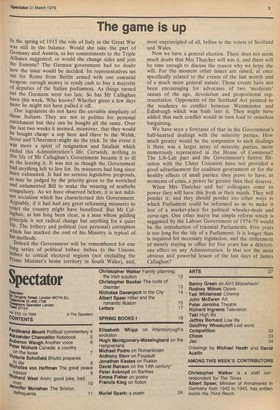The game is up
In the spring of 1915 the role of Italy in the Great War was still in the balance. Would she take the part of Germany and Austria, as her commitments to the Triple Alliance suggested; or would she change sides and join the Entente? The German government had no doubt how the issue would be decided. Its representatives set out for Rome from Berlin armed with one essential weapon: enough money in ready cash to buy a majority of deputies of the Italian parliament. As things turned out the Germans were too late. So has Mr Callaghan been this week. Who knows? Whether given a few days More he might not have pulled it off.
Our legislators do not have the enviable simplicity of those Italians. They are not in politics for personal enrichment but they can be bought all the same. Over the last two weeks it seemed, moreover, that they would be bought cheap: a sop here and there to the Welsh, Scots and I Ulstermen t might do the trick. In the event it was more a spirit of resignation and fatalism which ended this Administration's life. Certainly, nothing in this life of Mr Callaghan's Government became it so ill as the leaving it. It was not as though the Government had anything left to live for. Its resources had long since been exhausted. It had no serious legislative proposals, as may be judged by the priority given to the wretched and unlamented Bill to make the wearing of seatbelts Compulsory. As we have observed before, it is not militant socialism which has characterised this Government. Arguably, if it had had any great reforming measures to enact the country might have benefitted. But Mr Callaghan, as has long been clear, is a man whose guiding Principle is not radical change but anything for a quiet life. The bribery and political (not personal) corruption Which has marked the end of his Ministry is typical of his methods.
Indeed the Government will be remembered for one long series of political bribes: bribes to the Unions, bribes to critical electoral regions (not excluding the Prime Minister's home territory in South Wales), and, most unprincipled of all, bribes to the voters of Scotland and Wales.
Now we have a general election. There does not seem much doubt that Mrs Thatcher will win it, and there will be time enough to discuss the reason why we .hope she will. For the moment other issues are raised, at once specifically related to the events of the last month and of a much more general nature. Those events have not been encouraging for advocates of two 'moderate' causes of the age, devolution and proportional representation. Opponents of the Scotland Act pointed to the tendency to conflict between Westminster and Edinburgh which was built into it. They might have added that such conflict would in turn lead to ceaseless bargaining.
We have seen a foretaste of that in the Government's half-hearted dealings with the minority parties. How much greater would be the temptation to such dealings it there was a larger array of minority parties, more numerously represented in the House of Commons? The Lib-Lab pact and the Government's furtive flirtation with the Ulster Unionists have not provided a good advertisement for coalition government or for the healthy effects of small parties: they prove to have, at moments of crisis, a power far greater than they deserve.
When Mrs Thatcher and her colleagues come to power they will have this fresh in their minds. They will ponder it; and they should ponder too other ways in which Parliament could be reformed so as to make it less of a market-place for political wheeler-deals and carve-ups. One other major but simple reform which is suggested by the Labour Government of 1974-79 would be the introduction of triennial Parliaments. Five years is too long for the life of a Parliament. It is longer than is required for necessary legislation, and the enticement of merely staying in office for five years has a deleterious effect on any Administration. Is that not the most obvious and powerful lesson of the last days of James Callaghan?






































 Previous page
Previous page